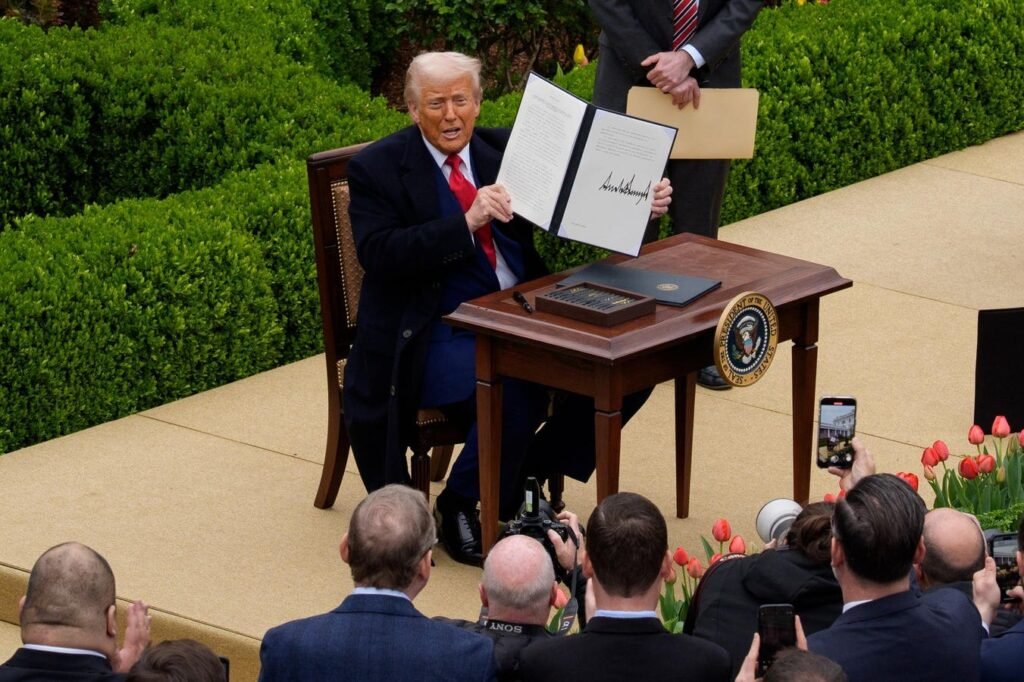WASHINGTON, DC – APRIL 2: President Donald Trump signs an executive order imposing tariffs on … More
Tariffs are in the news again as a 90-day pause in U.S. imported duties is about to expire on July 9th. While pharmaceuticals have thus far been exempt, President Trump has threatened to change that with 25% or higher tariffs on imported drugs, despite it being a violation of World Trade Organization rules, which exempt pharmaceutical products from such levies. Public health experts say tariffs would likely mean higher prices of branded pharmaceuticals and more generic drug shortages.
The administration’s stated rationale is that tariffs would incentivize drug makers to move their manufacturing facilities back to the U.S. and reduce reliance on countries that might halt trade in the event of war or another emergency.
The majority of brand name drugs used in the U.S. are imported. Tariffs will likely lead to higher prices of branded products, but also onshoring of manufacturing facilities. Indeed, several major drug companies have recently announced new U.S. manufacturing investments, likely in anticipation of future trade penalties. Nevertheless, reshoring takes years to carry out to completion.
In the short term, … More than 90% of prescriptions dispensed in the U.S. are generics.
In the first quarter of 2024, a record 323 drugs were in shortage, at least 70% of which were related to generics. Shortages of generic drugs include antibiotics and chemotherapy treatments.
According to a study by top subject matter experts from the industry and academia, 83% of the top 100 prescribed generic medications are import dependent to one degree or another … critical therefore to reshore generic manufacturing …
Generic drugs often rely on active pharmaceutical ingredients from countries such as India and China.
But with only a limited number of generic drug ingredients produced domestically. imposing tariffs on API could in the short term heighten already existing shortages or lead to new ones as well as possibly raising prices.
As Marta Wosińska and Rena Conti explain, two main factors determine whether tariffs will increase prices: The degree of tariff exposure and the ability of manufacturers to pass on price increases. Here, tariff exposure reflects the extent to which production of a given drug includes imported ingredients s exposed to various tariffs. The ability to pass on tariffs onto buyers will depend on how competitive the markets are, how constrained production is in the short term, and the extent to which there are contracts or government regulations that limit manufacturer’s ability to raise prices. These factors will differ for branded and generic drugs
Much higher profit margins for branded pharmaceuticals may blunt the impact of tariffs, as these can at least be partially absorbed. However, much lower margin products, such as generic small molecules, is a different story.
Normally, drug shortages would give rise to price increases which in turn would incentivize entrants … But there are limitations.
The Medicaid rebate program requires insurance plans participating in the program to purchase drugs at the “best price,” in other words, the lowest price at which a drug is sold, virtually anywhere in the marketplace. This can limit generic manufacturers’ ability to transfer price increases. Then there are mandatory Medicaid inflation rebates which could inhibit the ability of generic firms to pass on price increases if tariffs are introduced. since it requires them to pay rebates if the average price they charge to all buyers increases faster than a common measure of inflation, the consumer price index.
said tariffs on drugs could lead to generic drug shortages.
Tariffs will provide a strong incentive for increasing U.S. manufacturing of brand-name drugs but not of off-patent generics, which represent over 90% of the volume of prescriptions in the U.S.
Tariff pressure for both domestic and foreign manufacturers of generics will test their already low margins, potentially leading to product discontinuations or cost cutting that erodes quality. Any production disruptions in the already fragile generic injectable markets are likely to result in more shortages.
Adding tariffs would raise costs further, especially for generic medications, which account for 92% of all prescriptions in the U.S.


